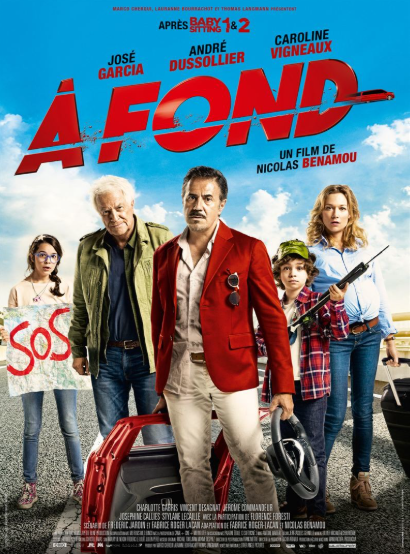1. Plot Summary
Tom, a cosmetic surgeon living in Paris, is looking forward to a family road-trip with his wife Julia, their two kids Lison and Noé, and their new high-end car (a “Danjoon Medusa”) that he’s just purchased. His father Ben, a somewhat clumsy, free-spirited (hippie-leaning) type, joins them—secretly bringing along Melody, a young woman deserted by her mother.
They embark on the drive, but things quickly take a turn: at some point, the cruise control (or speed regulator) of the car malfunctions, locking the vehicle at high speeds on the highway. The car becomes steadily less under the family’s control, triggering increasingly chaotic, stressful and comedic situations as the family tries to deal with a car that won’t slow down.
The setting shifts between highways (notably the A6 in France), rest stops, the inside of the car as tension builds, and various external location shots. The core of the movie is the family’s dynamics under pressure — fear, frustration, attempted problem-solving, as well as the comedic misadventures that come from having an uncontrollable car.
2. Notable Elements
Here are what I felt were the movie’s standout features — what works well, and what doesn’t:
What works / strengths:
- Concept + escalating tension: The premise of a family car trip gone awry due to a car that literally cannot slow down is both humorous and suspenseful. It offers a good mix of action & comedy. The escalating stakes (speed, danger, family conflict) keep the audience engaged.
- Set pieces inside the car and on the highway: Scenes where the car speeds, overtakes, or struggles to brake are visually well staged. The sense of being trapped — not just physically in the car, but in a situation out of control — is strong.
- Family dynamics and comic relief: The inter-family relationships (Tom trying to maintain calm, Julia reacting to surprises, the kids’ panic, Ben’s antics, and Melody’s inclusion) add variety. Some of the tension comes from personalities clashing more than the mechanical problem, which shifts things from pure car chaos to human comedy + stress.
- Use of practical driving / real locations: According to production notes, many shots are real, using real highways and real setups instead of relying heavily on green-screen. This gives the film more authenticity (especially in the driving scenes).
- Visual style & sound design: The sound of the engine, the road, traffic, traffic signs, reactions inside the car — these audio-visual details help build the chaos and unease. The cinematography captures both the landscape and the claustrophobia inside the car well.
What doesn’t work / weaknesses:
- Predictability: Some plot beats are quite foreseeable. The “malfunctioning car” trope is not new; the movie doesn’t always surprise. Once the central problem is established, many of the subsequent troubles follow expected patterns: attempts to slow down, brake, roadside stops, panic, etc.
- Emotional depth / stakes: While the family conflict is entertaining, the emotional stakes sometimes feel somewhat shallow. Viewers might not feel a deep connection with all characters (especially supporting ones) beyond the comedic stress.
- Tonal balance issues: Finding the right balance between comedy and genuine danger is tricky. In some moments, the danger feels undercut by comedic or absurd elements; in others, the comedy may feel slightly forced in the name of levity.
- Pacing lulls: There are periods where tension dips, where the film seems to stall a bit (e.g., repeated sequences of panic inside the car, attempts to solve mechanical issues). These aren’t deal-breakers, but some viewers may find boredom creeping in before the next big set piece.
3. Themes and Messages
Here are the film’s deeper ideas and what they might say, plus how they relate (if loosely) to holiday traditions / sentiments:
- Control vs loss of control: The car that won’t slow down is a clear metaphor for losing control—of situations, of family harmony, of planned vacations. It tests how people respond when their plans are disrupted.
- Family under stress / unity in crisis: The film explores what happens when a family’s routine vacation turns into a high-stress situation. How family members react differently (panic, frustration, resignation, solutions) shows both discord and moments of bonding under pressure.
- Technology dependency and overconfidence: The sophisticated high-end car (with advanced features like cruise control) becomes a liability. The movie suggests that overreliance on technology (or assuming everything is perfect) can backfire.
- Generational contrast: The father (Ben) being more immature in some ways contrasts with his son Tom, who has planned, structured, responsible. These differences amplify tension and sometimes comedy, but also underline themes of family expectations and generational divides.
- Adventure and unpredictability: The journey-trip is a vacation (time for rest, bonding, escape), but becomes an adventure full of unpredictable danger. In many holiday stories, unpredictability is often viewed negatively—but here it’s both challenge and source of humor.
Relating to holiday or festive sentiments: À fond isn’t a holiday movie per se, but the idea of taking family time, escaping routine, sharing moments together — even vacations turning chaotic — are very much part of many people’s holiday/travel experience. The film’s portrayal of frustrations, surprises, misadventures during a trip could resonate for people who travel or take holidays, because vacations rarely go exactly as planned. Plus, themes of patience, forgiveness, sticking together in adversity are often central in holiday values.
4. Personal Impressions
Here’s what I thought overall, what I enjoyed, and where I felt it fell short:
Strengths I enjoyed:
- The premise is solid and fun. The idea that a family with all their plans and modern technology faces a vehicle that won’t cooperate is relatable and gives a satisfying tension/comedy mix.
- Certain moments really land: highway chaos, rest stop disasters, when personalities clash under pressure. These provide laughs and also nail the feeling of travel fatigue + stress.
- The visual and sound treatment is above average for a comedy of this type; the road, the speed, the car’s behaviour feel more “real” than in many comedies that treat travel more lightly.
- José Garcia and André Dussollier bring good energy. The father/son relationship is interesting. Also Melody’s character adds a wildcard dimension.
Things that less impressed me:
- As noted, predictability weakens the later act. Once the central threat (car stuck, speeding) is firmly established, there are fewer surprises; the film leans heavily on repeating the same type of tension.
- Some comedic moments feel a bit forced or over-the-top; occasionally, jokes fall flat or seem inserted just to lighten mood, even if they break tension.
- Supporting characters beyond the main ones don’t always get much screen-time or development; when they do disappear or when their reactions are expected, it’s easy to forget some of them.
- For viewers seeking a deeper message or emotional payoff, the comedic tone prevents the film from going too deep. It stays relatively light, which is fine, but for some that’s a limitation.
5. Audience Recommendations
Here’s who I think will particularly enjoy À fond, and who might not:
Who might enjoy this:
- Families, especially those who travel or like road trip comedies with a twist. If you like the humor of “vacation mishaps” plus a bit of action, this could be fun.
- People who enjoy action-comedies that are light on violence but heavy on situational chaos (car trouble, speeding, mechanical failure, etc.).
- Viewers wanting something breezy, entertaining, not too heavy, but with some tension to break the comedic monotony.
- Fans of French comedy / European road movies, or those who enjoy films about technology failing.
Who might be less enthused:
- Those expecting a deep character drama or strong emotional arcs; À fond is more about entertainment than deep introspective journeys.
- Viewers who dislike predictable plots or who need surprises/twists. If you can see the majority of the storyline early on, this movie won’t change that.
- If you are sensitive to tension in cars, speed, travel anxiety — the film intentionally puts you in the stressful seat, so it could be uncomfortable at times.
6. Conclusion & Rating
Conclusion:
À fond (Full Speed) is an enjoyable, if somewhat formulaic, action-comedy that uses a simple high-concept setup (a car that can’t stop) to explore family, control, and travel chaos. It doesn’t break major new ground, but it does enough to entertain, especially in its pacing early and the way it leverages both danger and humor. Some weaknesses in predictability and tonal balance keep it from being outstanding, but for what it is, it delivers.
Star Rating: ★★★☆☆ (3.5 out of 5)
Watch more:




